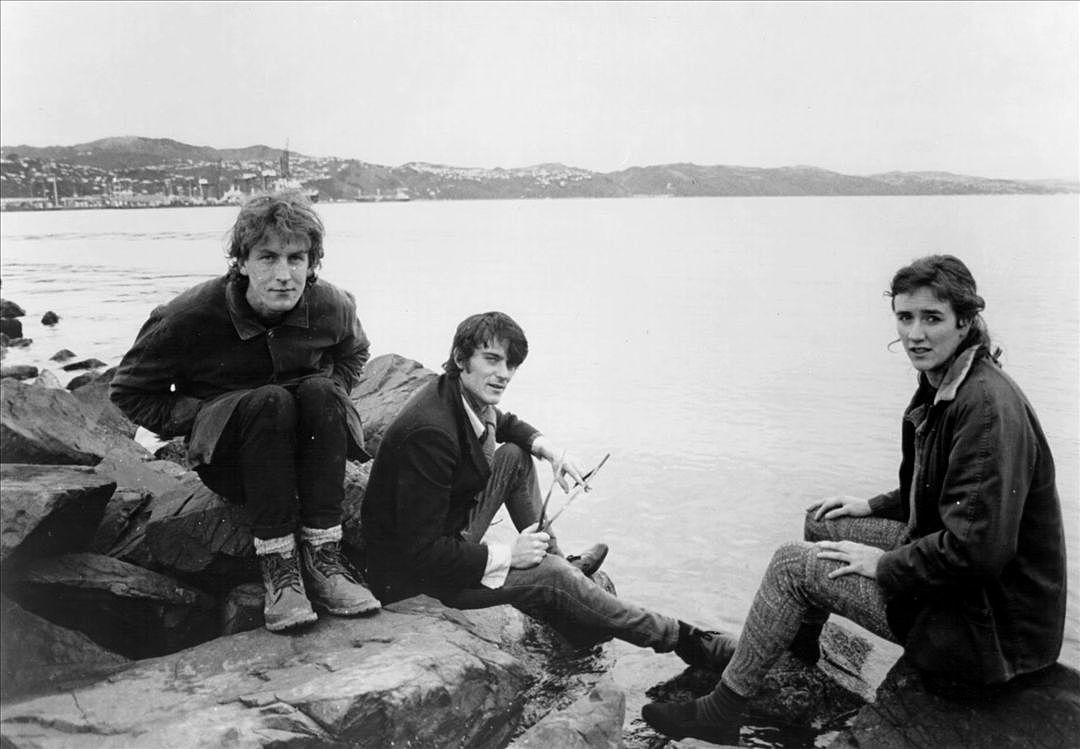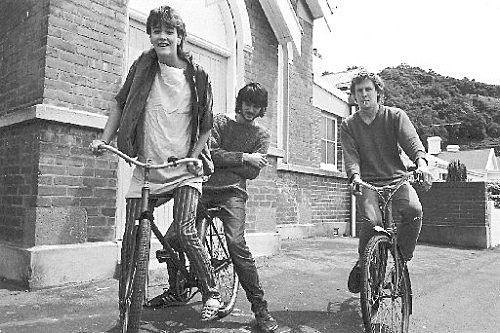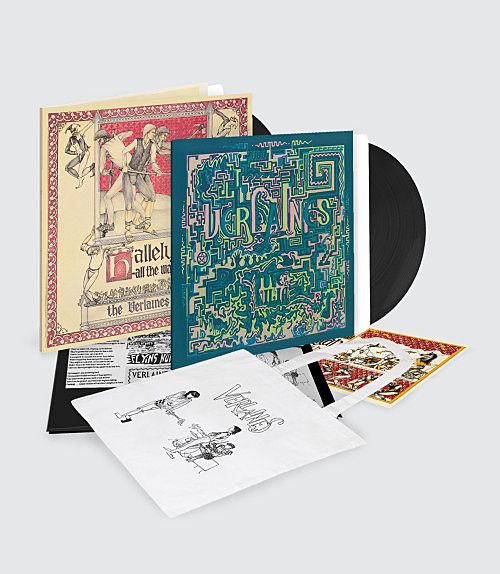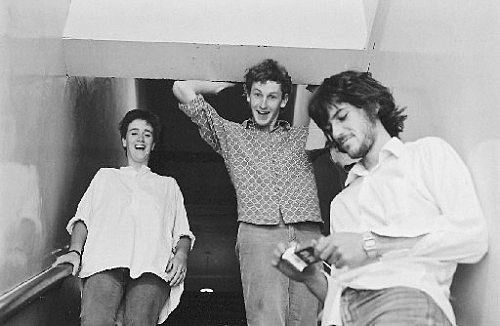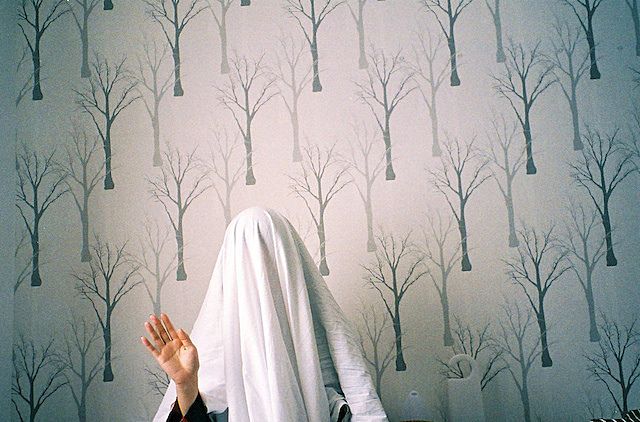Don't Send Me Away: The Verlaines, Reformed and Reissued
To commemorate the reissue of the Verlaines' debut album, the same trio that recorded it nearly thirty years ago are performing the whole thing live this weekend. Gavin Bertram talks to frontman Graeme Downes about why now is the right time.
The Verlaines were there at the beginning - EP 2, Side 2 of Flying Nun's 1982 Dunedin Double EP. Their three tracks from that scene-defining document - 'Angela', 'Crisis After Crisis', and 'You Cheat Yourself Of Everything That Moves' - already hint at their elliptical and shambolically literary peaks, and were later packaged up with other early material on the Juvenilia compilation. That 1987 collection, and the band's 1985 debut album Hallelujah All the Way Home have just been reissued on lavish vinyl editions courtesy of Flying Nun's partnership with New York label Captured Tracks. On Saturday the Verlaines line-up that recorded Hallelujah - Graeme Downes, Jane Dodd, and Robbie Yeats - perform the album in its entirety at the Kings Arms. Gavin Bertram speaks to Verlaines founder Downes about the reissues and related topics.
How involved have you been with the reissues?
Not a lot. Stephen Stedman did most of the work down at (Dunedin's Albany St) studio,digitising the masters through the desk. Most of which was usable and apparently sounds very good, but I haven't heard it yet. That's been the bulk of the work from our end. The rest of it has been okaying artwork and digging up some images that might not have been published before.
It must be great to have the opportunity?
Well, what can you say? You're talking about .0001% of anything that's made in popular culture being reissued 30 years after it was written. So that tends to say something I suppose, that it's pretty timeless stuff. We've been rehearsing it for a gig in a fortnight in Auckland, with the old line up of Jane and Robbie, playing the Hallelujah album live. It's great, it feels and sounds like it could have been written yesterday. It's still a unique bunch of songs that hang together really well as an album, and as a sort of listening experience. I'm really proud of it; as proud of it now as I was then. There's a lot of things I would do differently now, but you have to remember that we were pretty young and inexperienced. You have to remember that that was the first time we'd managed a 16-track recording studio. We'd done four, and then done eight-tracks, so there was a lot more ability to manage the whole thing, and get session players of clarinets, and cellos, and French horns and the rest of it.
You must have had a far clearer idea of what you were after by that stage (1985)?
Yeah, it was good. That technology wouldn't have been of any use to us earlier because we were greener then. It was the right time to jump up to the bigger format and letting your mind go in terms of what else can we do? Instead of just the three of us we could have some fun and create something that was a different experience. I was back at uni well and truly by that time, so I had the chops to be able to do those arrangements. And I was able to listen to the album in its entirety for the first time in a lord only knows how long when Jane and I had a rehearsal, so she could get here fingers around the bass lines again, so we were trying to play along with the record which is just insanely fast. We're getting there, which is good.
Was it fun recording it, or was it also stressful being in the bigger studio for the first time?
It wasn't stressful at all, we had enough recording under our belt. And I meticulously planned every hour of the day for how ever many days we did it for. We'd been gigging a lot to save the money because we were paying for it ourselves. So it was literally at 4-6pm on a Wednesday there were French horn players coming in, all the way through to the mixing process, it was all timed to the hour more or less. And because it just went like clockwork through that there wasn't any stress at all. It was quite good pressure in a way – it was that take we were going with because we were running out of time; it was tape, so you have to make those kinds of decisions.
So far more managed than a lot of the Flying Nun sessions would have been at that time?
No, probably not. I think Sneaky Feelings, with Send You around the same time, I imagine they worked pretty similarly. You just had to, otherwise you didn't get a record. If you blew your time you didn't get the thing finished, so we had to be organised. It was actually quite a good thing. These days people can mess around in their bedrooms on ProTools forever, so it's actually quite a good discipline in its own way.
These reissues are part of Flying Nun's arrangement with Captured Tracks. It's obviously a fruitful partnership?
From what I've been hearing it's going well. I'm looking forward again to seeing what people in foreign lands make of it, particularly if a younger generation hook into these reissues. It's good – there's a lot of back catalogue of us lying around, and there are plans afoot to do Bird Dog and Some Disenchanted Evening next year. We have a live record from 1986, a double album, coming out through Far South next year, and we'll probably digitise Over the Moon which only had a limited run in the late 90s. We've got the masters down there so we'll digitise and remix, and re-release that probably on vinyl as well. Plus we're hoping to have a new album mixed by Christmas and I'm hoping to write another one over the summer. So it's actually a pretty busy, frantic time, with the amount of productivity and interest in the old stuff coming back as well.
The vinyl collectors' market seems to be a big driver behind the reissues?
They've reproduced the gate-fold for Hallelujah, which is great because that's what it is. When we made it it was kind of like a big artistic statement to make that record, and we just said to Flying Nun at the time 'this is what we want, like Blonde on Blonde or whatever – we don't care if we don't make any royalties off it, we just want it to be a wonderful thing'. So if it was going to be reissued, then reissue it in that way. It was such a lot of effort that Charlie Stone and all of us actually expended on all those letters on the inside gate-fold. It was a lot of work to conceptualise all that. So I'm pleased about that. And the vinyl thing, there's a lot of talk around this place about what it represents, but ultimately it's that, you know, the digital is worthless. You can swap it, send it, but this is a thing that will actually hold value. Second hand record shops and Ebay will tell you that in fact they appreciate in value.
As opposed to digital, artists may make a little money from vinyl?
Yeah, it's about money, but it's about the artistic statement. The thing about an LP is that you're not putting it on random play; if you don't want to bugger your vinyl by dropping a needle onto a particular track, then you start it at the beginning and listen to the rest of it. That's how the thing was designed to be listened to, as opposed to individual songs. It's very much an accumulative emotional roller-coaster that goes through the whole thing. That's what it is. For me that's the most pleasing thing, because even though we went to CDs... I've always composed an album format, not single download. It's an immersion in someone's world for 40 minutes, which is historically what we have always liked – the classical world tends to be that immersion in someone's thought and ability to hold a concept together over a reasonably long time period. When you think of it in those terms it's probably no surprise really that the random digital would eventually come back to wanting that experience.
When Flying Nun was resurrected four years ago, the reissue programme was a large part of Roger Shepherd becoming involved again. There have been personnel changes since; how do you think it's tracking?
I think they're doing a really good job. I haven't been involved in that process, but once you go back to vinyl there are test pressings and making sure it's okay. Considering that the process is pretty difficult and time consuming I think they're doing pretty well. I think there's becoming a lot of synergy between Arch Hill, Flying Nun, and Far South down here, kind of talking. That's going to be really good. There's basically no better time to be a New Zealand artist right now, based on a certain young lady.
Flying Nun aren't the only label reissuing Dunedin music, there are also Northern Hemisphere outfits like De Stijl, Mie, and 540 doing it. Does it surprise you that there's still that interest in what happened here 25 or more years ago?
No. It was always pretty unique, and there was such a lot of it over such a short time. That's the thing that scenes and schools are kind of made of – a loosely shared aesthetic, and a glut of quality. When Tuatara, the first Flying Nun compilation was released, the reviews from Germany and the UK were saying 'they're just the best independent record company in the world right now'. And like our music, it just doesn't date particularly. When we did five shows here and Australia we were playing to varying age groups, and playing songs written in 1981 through to 2011. They all rub shoulders together well and the old ones hold up. The fact that a lot of us – The Bats, Clean, Chills – are getting back in the saddle at the moment, that helps. I think for music fans there's always a flicker of excitement about Bob Dylan or Neil Young are going to do next. It's part of a lifelong love of music. That is a really fun thing, just as it is with classical, with early periods and late periods. The fact is that a lot of younger bands name-check Flying Nun bands - it's still something that excites people.
It's influential now, but in the early 1980s you encountered resistance from the music establishment in New Zealand.
It was music that was on the cultural fringes when we wrote it, and it still is. These reissues are probably going to make more of a stir in New York than they will here, and that's fine. The music is so complicated, apart from anything else. So unless you're almost schooled, or have practised listening – because you have to; all the classical stuff I have I've had to practise listening to it before I could understand it. It's not just four chord pop music, some of these songs have 40 or 50 chords, and structures that have nothing to do with A-A-B-A, or verse-climb-chorus structures. That's not easy to get into, for most people it would just be from a different planet. As a generation we were fine with it because people did crazy complicated things, and they did simple things too. Every time people did something outrageous it seemed people liked it more. I mean, Martin Phillipps said that, 'I keep trying to shock people, but I can't'. It's a kind of cultural thing through that period, sort of 1980 to 84. Some of The Chills' songs - 'Submarine Bells', 'Pink Frost', 'Ghosts' – and a great many others are quite unusually big, with lots of music in them and not much lyric. The music is doing a lot of the work, and that's a lot more of a classical way of proceeding than a pop way. So it's difficult music, but difficult music sometimes has a habit of having a longer lifespan.
Do you feel some sense of vindication because of the reissues, as Bruce Russell does, with Peter Jefferies' 1990 album The Last Great Challenge in a Dull World being reissued by De Stijl?
It's really funny... I work with Peter van der Fluit from the Screaming Meemees, and he's mastering a lot of the records, and I recorded the solo record at his and Mike's studio in Auckland. At the time we probably would have gone 'no way Jose'. And several other more prominent mainstream rockers from that period I've met at conferences, we just chat. When you're young everything is black and white and your whole aesthetic outlook is based around the music your making and everything else is shit – to a certain degree that exists. When you get older and those things fall away a wee bit you see it was actually hard for all of us. Jordan Luck is a big Verlaines fan, and he can sing it better than me. It's a really healthy place that it's at now.
Will you also be doing Hallelujah All the Way Home in its entirety in Dunedin?
Yes probably next year, we're looking at that. Only two weeks ago Jane first picked up her bass in anger, to see whether any of it would come back. It's all just come back having not played any of the songs since at least 1986, the muscle memory has come back, and we've had two practises with Robbie now and it's starting to gel. It was only two weeks ago that we were even thinking we were capable of doing it anywhere, but I'm sure we'll get it done down here as well.
Are there other Flying Nun records you would like to see reissued?
There's a lot of output there. It's just interesting to talk about Bruce Russell feeling vindicated, and you do, it's satisfying. It's going to be really interesting to see what demand forces to be re-released. That was the dynamic whereby Flying Nun conquered in the first place: they put out a record or a couple of records, and everyone went 'this is great' and then when another Flying Nun record came out you went and bought it because they'd built up this immense trust with the audience that if it was on the label it was going to be as good a listening experience as the other stuff. That and the sheer quantity of stuff coming out in that early 80s part, for the most part they were pretty careful about what was on the label.
It's great for us, it's great being a teacher and being able to do these sorts of things. You can actually hold it up to the students and go, “here it is - 30 years later. For you this is seriously a problem, because it's still here and has been re-released and is being sold around the world. It asks the question why?”
Do you think for those students, who maybe releasing their first stuff soon, that would even be a possibility in 30 years time?
I don't think anyone ever expects... I don't know, it's hard to tell. Really memorable landmark moments actually appear quite rarely I find. And more and more rarely since the 60s and 70s, which is when there was a phenomenon of a lot of really great records coming out over a short time. It's probably harder to create that originality as the art-form with every decade that goes by, so many things have been done. It's harder to break ground than it used to be. But you still 14-year-old kids on the street with Nirvana t-shirts on, and Led Zeppelin t-shirts for Africa. People who weren't even born revere this stuff. When we audition students so many of them reference the 60s. It's all part of canon formation I guess. Time destroys rubbish really quickly. That's just the truth of everything. To keep a piece of art alive you've got to store it and care for it and not be tempted to throw it in the garbage. It is a real privilege to have stuff from that long ago resurface, and I'm really looking forward to playing the album live, that's tremendously exciting playing the songs again. Because they're so complicated.
Flying Out presents Jangle All the Way, with The Verlaines playing Hallelujah All the Way Home, plus Surf City, Trick Mammoth, and Astro Children. Kings Arms, 7.30pm, 14 December
Correction: In an earlier version of the article, we mistakenly named Robbie Muir, instead of Robbie Yeats, as part of the original Verlaines line-up that recorded Hallelujah.
